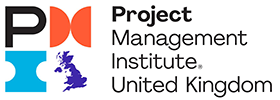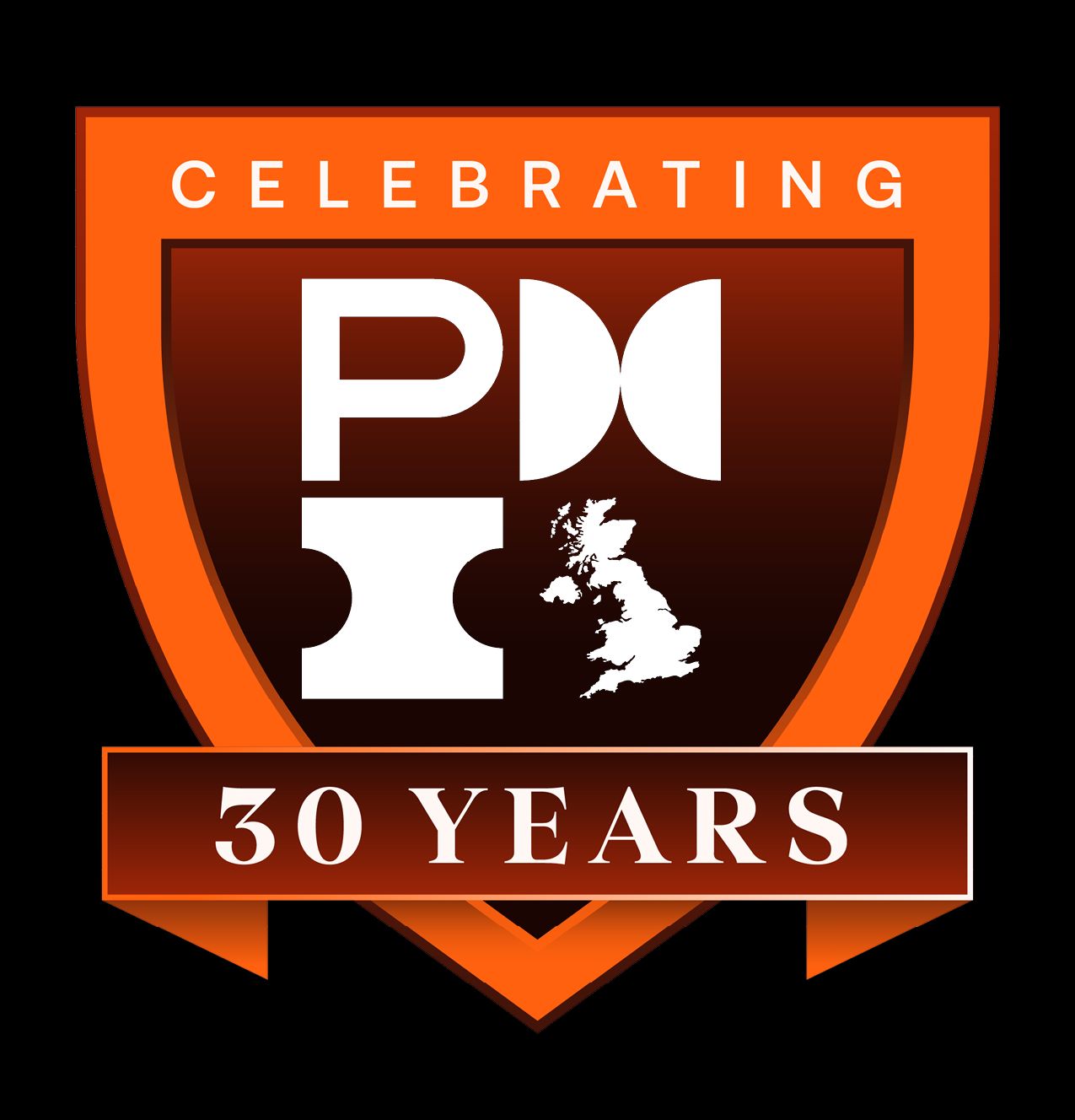Introduction
At the 19th Project Management Conference held in Greece, the spotlight was firmly on the transformative potential of Artificial Intelligence (AI) within the realm of project management. This pivotal event featured Kristian Bainey, a renowned expert in AI-driven project management, who delivered two enlightening sessions across consecutive days. His sessions provided a deep dive into the integration of AI tools, such as ChatGPT, in enhancing various aspects of project management. From navigating risks and driving innovation to strategic talent development, Bainey’s insights offered a comprehensive roadmap for project managers looking to harness the power of AI to achieve peak productivity and success.
Day 1 Presentation – AI-Empowered Project Management: Navigating Risks, Transforming Change and Shaping the Future
Presentation Intro
Kristian Bainey’s presentation was an enlightening and thought-provoking discourse on integrating Artificial Intelligence (AI) into project management. His session offered valuable insights into how AI, particularly tools like ChatGPT, can revolutionise traditional project management methods, enhancing decision-making, risk management, and documentation processes.
Understanding AI in Project Management
The speaker began with a comprehensive introduction to AI, tracing its roots back to the “mechanical brain” invented in 1932 and Alan Turing’s pivotal contributions in the 1950s. He emphasised that AI should not be perceived as a job replacement threat but as a powerful tool to augment human capabilities. AI provides data-driven insights and options that might otherwise be overlooked, thereby speeding up productivity and enabling more informed decision-making.
Generative AI (GenAI), a sub-discipline of AI that includes technologies like ChatGPT, was highlighted for its ability to create new content such as text, code, and images. The presenter explained how ChatGPT utilises Natural Language Processing (NLP) to perform various language tasks by accessing a vast amount of data from the internet.
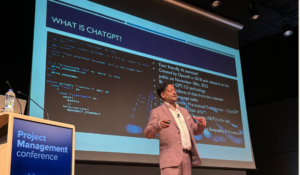
The Role of ChatGPT in Project Management
One of the key points in Bainey’s presentation was the potential of ChatGPT to assist project managers in several critical areas:
- Project Documentation: ChatGPT can generate project documentation, plans, schedules, and templates, significantly reducing the time and effort required to produce these materials manually. This automation not only improves efficiency but also ensures consistency and accuracy in documentation.
- Decision-Making: By analysing large datasets and providing data-driven insights, ChatGPT aids in making informed decisions. This capability is crucial for project managers who need to evaluate numerous variables and outcomes swiftly.
- Risk Management: AI’s predictive analytics can identify potential risks and offer mitigation strategies, enabling proactive risk management. Bainey highlighted the importance of human oversight in this process, as AI tools should complement rather than replace human judgement, especially in areas requiring empathy and ethical considerations.
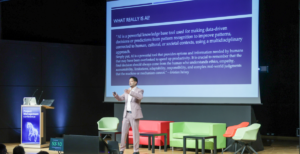
Practical Applications and Benefits
Kristian Bainey provided several practical examples of how ChatGPT can be integrated into project management:
- Summarisation: ChatGPT can summarise complex documents and reports, making it easier for project managers to digest and disseminate information quickly.
- Cost-Benefit Analysis: AI can assist in performing detailed cost-benefit analyses, helping project managers make financially sound decisions.
- Business Case Development: ChatGPT can craft persuasive business cases by presenting data in a clear and compelling manner, highlighting key points and projecting financial outcomes.
- Project Planning and Scheduling: AI tools can streamline project planning and scheduling, identifying critical paths and dependencies to optimise timelines and resource allocation.
The speaker emphasised the importance of prompt engineering, a technique used to tailor AI responses to specific roles or contexts. By refining prompts, project managers can ensure that the AI-generated outputs are relevant and useful. For instance, a prompt might instruct ChatGPT to act as a senior IT project manager and provide a detailed project charter for a construction project in Greece.
The Human-AI Partnership
Throughout his presentation, Kristian Bainey reiterated that AI is a tool to augment human capabilities rather than replace them. The final decisions in any project management scenario should always rest with humans, who bring essential qualities like ethics, empathy, and complex real-world judgement to the table. AI can process and analyse vast amounts of data much faster than humans, but it lacks the nuanced understanding and emotional intelligence that human project managers possess.
Bainey’s insights into the integration of AI in project management were not only informative but also inspiring. He painted a picture of a future where AI and human project managers work in tandem, leveraging each other’s strengths to deliver superior project outcomes. The practical tips and examples he shared provided a roadmap for project managers looking to incorporate AI tools like ChatGPT into their workflows.
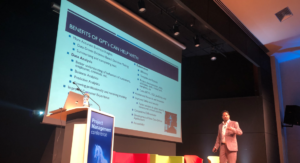
Presentation Conclusion
In conclusion, Kristian Bainey’s presentation at the 19th Project Management Conference in Greece highlighted the transformative potential of AI in project management. By embracing AI tools, project managers can enhance their decision-making capabilities, manage risks more effectively, and streamline project documentation processes, ultimately shaping a more efficient and innovative future for project management.
Day 2 Workshop – AI in Action: Revolutionising Project Management with Advanced Tools and Strategic Talent Development
Workshop Intro
On the second day of the Greek conference, Kristian Bainey led an insightful workshop titled “AI in Action: Transforming Project Management through Lifecycle Mastery, Advanced Tools, and Strategic Talent Development.” This workshop dived into various facets of AI’s impact on project management, providing a comprehensive overview of the techniques, tools, and strategies essential for modern project managers.
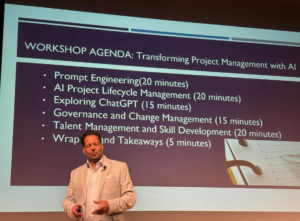
AI Project Lifecycle Management
The speaker emphasised the critical importance of mastering the AI project lifecycle. He explored techniques and methodologies that are pivotal in managing AI projects from initiation to completion. By integrating Generative AI (GenAI) into Agile, Hybrid, and Waterfall methodologies, project managers can enhance both traditional and adaptive practices.
In a hybrid methodology, GenAI supports adaptive strategies, iterative planning, and design, as well as core development and automated deployment. This blend ensures that projects are not only well-structured but also flexible enough to adapt to changing requirements and conditions.
In contrast, the Waterfall methodology benefits from GenAI’s precision in each phase, from AI-powered market analysis in the initiating phase to automated deployment and ongoing support, ensuring a smooth and error-free project launch.
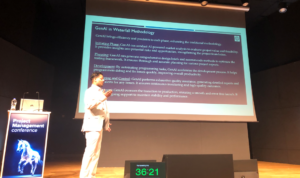
AI Tools and Technologies for Project Management
The exploration of AI-powered tools, platforms, and technologies was another significant aspect of Bainey’s workshop. AI tools can automate repetitive tasks, enhance decision-making processes, and improve overall project efficiency. For instance, AI-driven project management platforms can provide predictive analytics, resource management, and risk assessment, which are crucial for maintaining project timelines and budgets. By leveraging these advanced tools, project managers can focus more on strategic planning and less on mundane tasks, thereby driving project success.
Data Governance and Quality Management
In AI projects, data governance and quality management are paramount. The facilitator discussed the importance of robust data governance frameworks and effective data quality management practices. High-quality data is the foundation of any successful AI project. Without proper governance, projects are at risk of data breaches, inaccuracies, and inefficiencies.
Implementing stringent data governance policies ensures that data is secure, accurate, and used responsibly. Moreover, AI tools can assist in monitoring data quality and providing real-time alerts for any discrepancies, thus maintaining the integrity of the data throughout the project lifecycle.
Talent Management and Skill Development
A significant portion of the workshop was dedicated to talent management and skill development. As AI continues to evolve, there is a growing demand for professionals with expertise in AI and related technologies. Kristian Bainey highlighted strategies for recruiting, training, and retaining talent with the necessary skills to drive AI projects forward. Organisations must invest in continuous learning and development programmes to keep their teams updated with the latest AI advancements. This not only enhances the capabilities of the workforce but also ensures that the organisation remains competitive in the market.
Case Studies and Success Stories
To provide a practical perspective, The facilitator shared several case studies and success stories showcasing the implementation of AI in project management across various industries. These real-world examples highlighted the lessons learned and best practices that can be applied to future projects.
For instance, an AI-based customer service chatbot project for a retail company demonstrated how collaboration across teams and the use of AI tools can lead to the successful deployment of an advanced, functional chatbot within a tight timeline. Such case studies serve as valuable references for project managers looking to implement AI in their own projects.
In addition to his workshop, Kristian Bainey is also the author of the recently published book “AI-Driven Project Management: Harnessing the Power of Artificial Intelligence and ChatGPT to Achieve Peak Productivity and Success.” Released in April this year, the book provides an in-depth exploration of AI’s role in project management, offering practical insights and strategies for leveraging AI to enhance productivity and achieve project success.
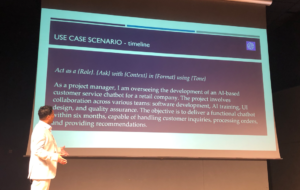
Workshop Conclusion
Kristian Bainey’s workshop at the Greek conference was a testament to the transformative potential of AI in project management. By mastering AI project lifecycle management, leveraging advanced tools and technologies, implementing robust data governance practices, and fostering strategic talent development, project managers can navigate the complexities of modern projects with greater efficiency and effectiveness. As AI continues to evolve, it is imperative for project managers to stay ahead of the curve and embrace these advancements to drive their projects and organisations towards success.
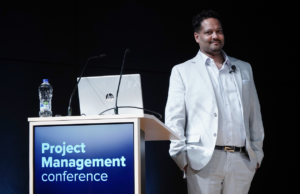
Final Conclusion
Kristian Bainey’s contributions at the 19th Project Management Conference underscored the profound impact AI can have on the future of project management. His presentations and workshop illuminated the ways in which AI tools like ChatGPT can revolutionise traditional practices, offering enhanced decision-making capabilities, streamlined documentation processes, and robust risk management strategies. By embracing AI, project managers can not only augment their efficiency and effectiveness but also position themselves at the forefront of innovation in the industry. As AI technology continues to evolve, the integration of such tools will be crucial for driving project success and maintaining a competitive edge in an increasingly dynamic and complex landscape. Bainey’s sessions provided invaluable insights and practical strategies, inspiring project managers to leverage AI for superior outcomes in their projects.
About the Author

Lavinia Descultu, AI in Project Management Community of Action, PMI UK Chapter. With a deep interest in artificial intelligence, Lavinia is committed to integrating AI tools into her project management practices enhancing efficiency and driving results. She is a portfolio, program, and project professional with over two decades of experience in delivering innovative digital transformation.
